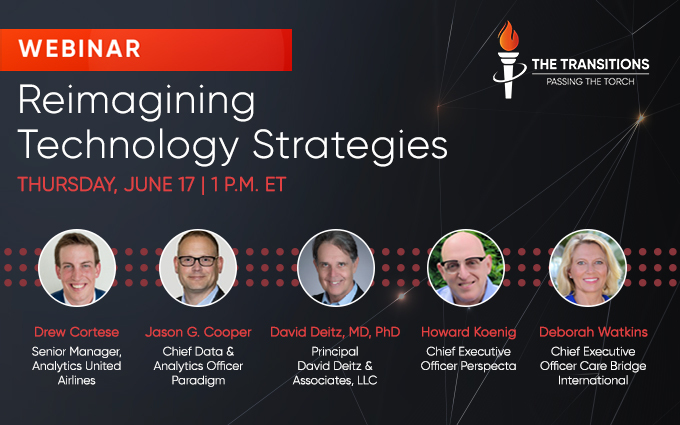07/14/2021

Jason Cooper, Chief Data and Analytics Officer for Paradigm, recently participated in a webinar as part of The Transitions’ ongoing series to promote strategic growth in workers’ compensation. The panel, “Reimagining Technology Strategies,” brought together a group of talented leaders to discuss opportunities for adopting technology within the industry. Although relatively new to workers’ compensation, Jason brought a unique perspective and insights gained from decades of experience in health care data and analytics.
Joining Jason were moderator Drew Cortese, Senior Manager of Analytics for United Airlines; Dr. David Deitz, Principal of David Dietz & Associates; Deborah Watkins, CEO of Care Bridge International; and Howard Koenig, CEO of Perspecta. During the hour-long webinar held on June 17, the panel explored the biggest questions, obstacles, and lessons learned from other industries that could help workers’ comp leverage technology in a positive way.
The need for forward-looking technology strategies in workers’ comp
One of the major underlying themes of the The Transitions webinar series has been an impending generational shift in workers’ compensation. As more veteran industry experts retire in the coming years, it’s important for organizations to have plans in place to attract new talent, while preserving veteran operational knowledge and experience.
For years, the larger workforce has been undergoing a digital transformation into more efficient ways of doing business with different tools. However, there is often a perception that workers’ compensation is lagging behind other sectors when it comes to innovation and technology. While many organizations and stakeholders recognize that technology, data analytics, data visualization, self-service tools, and transparency can offer competitive advantages and better outcomes, there are many hurdles to adoption in this unique sector of health care.
Overcoming the new and existing challenges to workers’ compensation technology
During the engaging discussion, the expert panelists shared their knowledge and practical experiences regarding innovation in workers’ compensation. They particularly focused on how it can affect the next generation of industry professionals. Topics covered in the webinar included:
The panel also discussed telehealth utilization before and after the pandemic, as well as the potential efficiencies it could create for workers’ compensation. Another key topic was how to meet changing expectations for service delivery in a time when patients are demanding an efficient, patient-centric experience. Jason highlighted the ability for technology to create transparency and accountability in order to move workers’ compensation further toward a value-based care model.
Tapping digital data for greater value and efficiency
In closing, Jason also emphasized the significant amount of manually entered, “born analog” data in workers’ compensation. He stressed that by transitioning to more digitally born information, the industry can harness more of this currently inaccessible and latent resource. Jason and other panelists saw this as a critical step toward greater transparency and accountability in workers’ compensation, which could lead to better outcomes for all parties.
View the full webinar replay on The Transitions YouTube Channel. To find out more information about The Transitions organization, visit www.thetransitions.org.